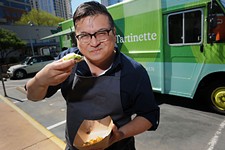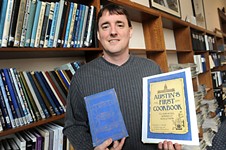Two Trips to Costco
A mother and a private chef share their notes
By MM Pack, Fri., Dec. 22, 2006
From a Professional's Perspective
Costco is many things to many people, but I'd be the first to agree that shopping there isn't for everyone: If you don't possess beaucoup storage space, a big fridge, the wherewithal to navigate recalcitrant carts the size of rowboats, and the muscle to lift and tote heavy loads, then Costco probably isn't an important part of your life as a consumer. However, for many of us on the little end of the culinary business – private chefs, personal chefs, small caterers, or anyone filling multiple mouths on a regular basis while trying to balance quality, quantity, and cost – Costco can certainly provide a source of quiet satisfaction.
Much has been written about Costco's successful business model that focuses on selling quality products at high volume and low prices. Goods are usually bulk-packaged and targeted primarily to small businesses and large families willing to pay an annual membership fee, hoist their own hefty containers, and dispense with such amenities as credit cards, advertising, and decor. Costco is known for fair employee compensation, internal promotion, and a low staff turnover. Unless you shop at different stores around the country (370, last count), you might not realize that, in addition to internal and national brands, regional Costcos sell regionally produced goods. Tracy Claros of Austin's Sticky Toffee Pudding Company told me that her products are in our Costcos because the regional buyers sought her out. Recently, I was pleased to see a couple of wines from the Texas Hill Country's Becker Vineyards.
As a private chef, my job is to keep my two client households (three, if you count my own) content and well-fed via high-quality family meals, snacks, dinner parties, cocktail buffets, business lunches, happy-hour hors d'oeuvres. Thus, I shop. A lot. Every day. And all over the place, from farmstands to international groceries to specialty stores to upscale destination markets. Austin chef/restaurateur Foo Swasdee likes to tell her cooking classes that the principal part of Thai cooking is "shopping and chopping." I contend that the principal part of all cooking is shopping and chopping. Particularly shopping. Unlike our forebears who grew and produced everything, if you don't shop well, how can you possibly cook well?
Of course, what constitutes shopping well is complicated and subjective; it includes elements of flavor, nutrition, variety, freshness, eye appeal, convenience, and cost, not to mention politics, ethics, and morality. From my professional perspective, a big part of shopping well is acquiring sizable quantities of various foodstuffs at reasonable costs that meet my (and my employers') standards of quality. I once heard a market analyst say that value is the intersection of product satisfaction, utility, and price. For me, that's where Costco comes in.
I'm not talking about all those other goods for sale at Costco – computers to Christmas lights to camping gear – or even about the kitchen-related staples I buy twice a year, like the giant rolls of foil and plastic wrap or pallet-sized bundles of paper towels and toilet paper. And I'm not referring to the already prepared, ready-to-eat foods so abundantly provided (just as they are at Central Market and Whole Foods and every supermarket). That's another shopping story. People pay me to cook specially for them, so I'm talking about ingredients, the basic culinary building blocks I use all the time – together with different ingredients from other sources – to create the dishes my clients want. An important part of my value to my employers is the ability to respond to last-minute requests. I always need to be ready to get creative and productive on very short notice: A stocked pantry is essential.
So, what do I buy at Costco? Upon reflection, I realize that it's almost always the same things. I automatically wend my way along the same route of long aisles, filling my cart with those items I want in the kitchens at all times. I don't really even need a list.
First stop is the bread department. I often use the 36-count package of dinner rolls ($3.79) for buffet sandwiches; they keep quite well in the freezer. The Panne Provino demibaguettes (six for $3.99) and 2-pound multigrain loaves are properly crusty and flavorful. (One of the things Costco shoppers don't have is choice among brands; one of the ways they keep prices down is to supply one brand per item, although that brand may vary regionally.)
On to the refrigerated section. I make a lot of tapenade, so a 2-pound tub of Krinos Pitted Kalamata Olives ($5.99) goes into the cart. Depending on upcoming party hors d'oeuvres, I often pick up proscuitto di Parma ($12.99 for 12 ounces) and a side of house-brand smoked salmon ($9.89 a pound). While I prefer fresh avocados for guacamole, ripe ones aren't always available, and I'm very pleased with the 3-pound containers of mashed avocado for $6.99, divided into three Cryovac bags (which freeze surprisingly well, by the way).
The cheese department is a source of multiple delights, albeit in large chunks. My particular favorites are 2 pounds of blue cheese for dressings and dips, fresh soft chèvre ($4.39 a pound), and fresh buffalo mozzarella ($9.99 a pound). (The 3-pound boxes of cream cheese for $4.59 and the giant bags of shredded cheddar, jack, and mozzarella – so useful for cheesecakes, big pans of Tex-Mex-style enchiladas, and homemade pizzas – are in the freezer section.)
Because I prefer to buy locally, seasonally, and in smaller amounts, I usually don't get much from the produce section. However, there are times when client requests or party-sized volumes indicate a detour there. One of my favorites is the tub of miniature sweet peppers, which are terrific for stuffed appetizers or on a roasted veggie platter.
I bake constantly for my employers, so I go through lots of pine nuts, walnuts, almonds, and sugar (free-trade, organic, $6.99 for 10 pounds), as well as unsalted butter (4 pounds, $6.09) and eggs (organic, 18 for $3.89).
In my opinion, dried, canned, and packaged goods are where Costco really shines, but it's also where you need some serious storage and/or volume consumption. For example, the huge bags of dried shitake mushrooms ($9.99) are a bargain and last forever. My cart always contains boxes of S&W canned tomatoes (12 for $7.49), tomato paste, sun-dried tomatoes ($7.09 for 32 ounces), Hellman's Mayonnaise ($4.99 for 4 pounds), extra-virgin olive oil ($11.85 per liter), Carr's Water Crackers (four boxes, $7.49), Super Lucky Elephant jasmine rice (30 pounds for $17.11), and S. Pellegrino sparkling water at $9.59 a case. You can see what I mean about the lifting thing.
Costco certainly doesn't meet all of my professional shopping needs, but having it available makes my job a great deal easier and economically viable. Now, excuse me, but it's the holiday entertaining season, and I gotta go shop.








